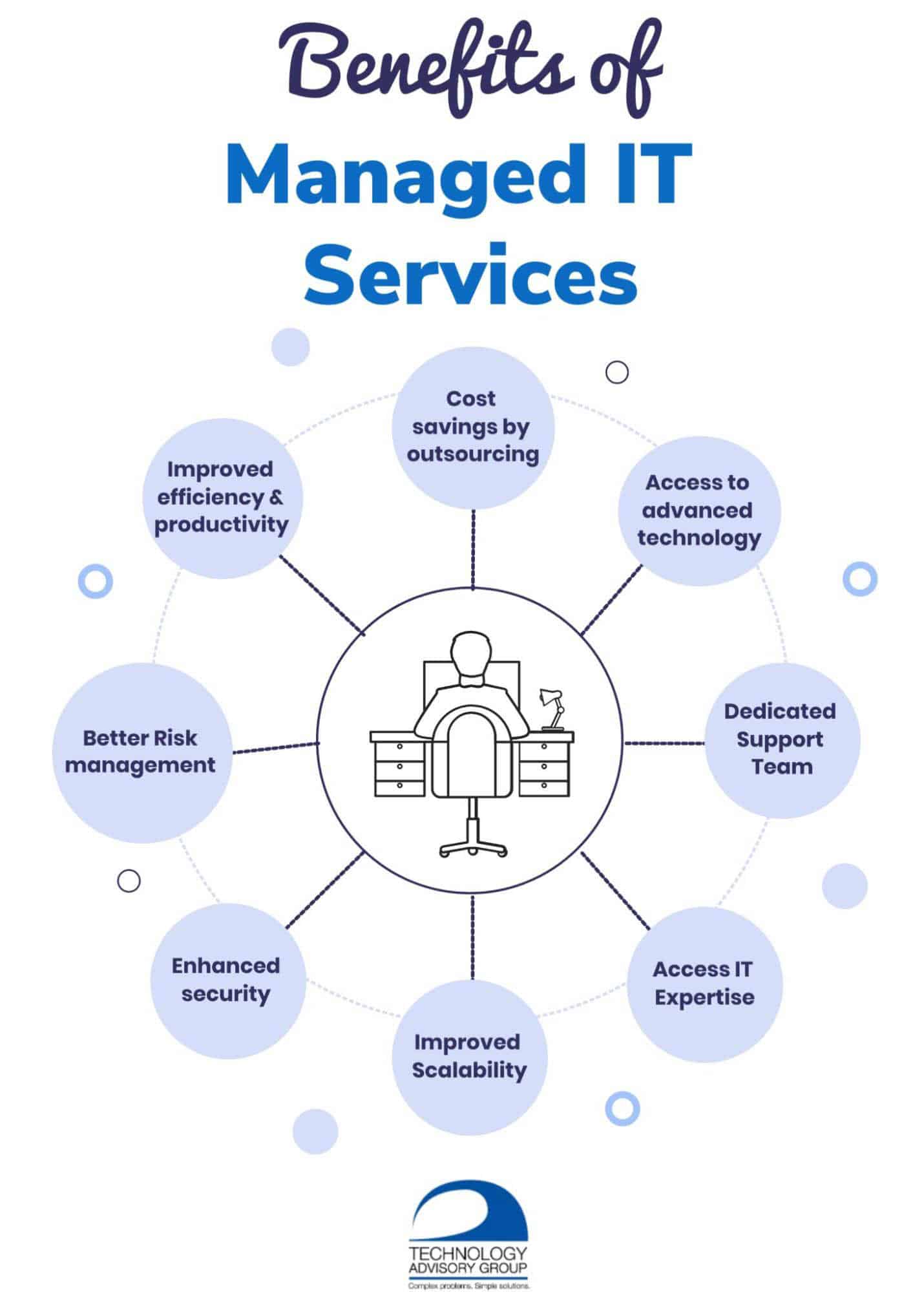The comparison of managed services vs. professional services can be understood by examining the major differences between the two.
First, managed IT services refer to outsourcing specific technology management tasks, such as network monitoring and security or software updates, to a third-party provider.
On the other hand, professional services encompass a wider range of activities that involve specialized expertise, much like consulting, cloud migration, or training.
Ultimately, managed IT services and professional services can both play valuable roles in helping businesses run efficiently and effectively. That’s why it is important for companies to carefully weigh the pros and cons before committing.
In this article, we will take an in-depth look at the differences between managed services vs. professional services.
What are Managed IT Services?
By definition, managed IT services refer to outsourced management of a company’s IT infrastructure and operations by an external provider. They are responsible for monitoring, maintaining, and troubleshooting a business’s technology systems.
This frees up valuable time and resources for the company to focus on core competencies and strategic initiatives.
Managed IT services also offer cost predictability through flat-rate pricing models and allow companies to stay current with the latest technology advancements without incurring high upfront costs. To add, more than 150,000 companies use managed IT services.Estimated to top $161 billion in revenue, the demand for managed services is on the rise. However, managed IT services may not be suitable for businesses that require highly customized or specialized technology solutions.
Is Your Business Protected From These Four BYOD Risks?Discover the four leading BYOD security risks organizations face, and what can be done about it. |
What are Professional Services?
Professional services are more project-based and encompass a wider range of activities that involve specialized expertise, such as consulting or training. These services can provide businesses with valuable insight and guidance in a particular area.
What are the Pros and Cons of Managed IT Services?
Knowing the advantages and disadvantages of managed services helps organizations determine whether managed services are a good fit. Among the leading benefits of managed IT services include:

While managed services provide many benefits, there are disadvantages to weigh. These include:
- Reliance on external provider
- May require a higher initial investment
- Difficulty finding the right managed IT service provider
- Loss of control over certain aspects of technology management
- Possibility of the service provider not meeting expectations or lacking expertise
What are the Pros and Cons of Professional Services?
Businesses needing less support than managed services often consider professional services. From improving the security posture of a business to helping organizations cost-effectively manage IT projects, here are the top benefits of professional services:
8 Benefits of Professional Services
- Enhanced security
- Reduced operating costs
- Improved efficiency and productivity
- Improved compliance with industry regulations
- Proactive approach to prevent future problems
- Access to a team of highly skilled professionals
- Customized solutions to fit specific business needs
- The ability to focus on core competencies and delegate IT tasks to experts
Unfortunately, there are some disadvantages of using professional services. The top five biggest drawbacks of professional services are:
- Higher cost: As opposed to managed IT services, professional services usually require a one-time fee that can be much more expensive.
- Limited availability: Depending on the company or individual providing the service, they may not have the capacity or flexibility to provide support when needed.
- Limited knowledge: While professionals may have expertise in specific areas, they may not have a broad understanding of all aspects of IT and how they work together within a business’ infrastructure.
- Lack of ongoing support: Once the project or task is completed, there is no guarantee of ongoing support from the professional.
- No guarantee of expertise: Just because someone calls themselves a professional does not necessarily mean they are, especially without proof of business or certifications. This information should be verified before engaging with a professional services provider.
Why Managed IT Services are Important For Businesses
Managed IT services play a vital role in business management.
Instead of hiring more of an in-house team, managed IT services provide expert support for a fraction of the cost. Furthermore, managed IT services offer round-the-clock monitoring and maintenance to ensure that any potential issues are immediately addressed and resolved.
These managed IT providers also stay current with the latest technology trends and updates, allowing businesses to stay ahead of the competition without having to constantly train and educate internal staff.
In addition, managed IT services allow businesses to focus on their core competencies instead of getting sidetracked by technical challenges or difficulties.
Why Professional Services are Used By Businesses
Professional services play an essential role in organizations. From providing strategic planning and consulting services to providing specialized expertise in certain areas of industry, professional services are cost-effective for organizations looking to spare internal IT teams.
Additional reasons why businesses leverage these services would be to improve organizational structure and processes, for overcoming specific challenges, and to remain competitive in an evolving marketplace.
In conclusion, managed IT services and professional services offer valuable benefits for businesses, but it’s important to carefully consider which option is best for your unique needs
Managed IT Services vs. Professional Services: The Differences
Every business has unique needs, goals, and budgets. While managed IT services may provide an invaluable solution for small to medium-sized businesses, professional services may be the best route for large organizations or organizations that need short term work.
| Interested in learning more about managed and professional services? Check out these blogs: |
Get the IT Services You Need From a Trusted Provider
Managed and professional services offer many different benefits to businesses.
By thoroughly understanding both services and carefully considering potential challenges, your organization can make informed decisions about technology management and specialized expertise needs.
Are you ready to take control of your business and find the right managed IT or professional services solution for your business? If so, Technology Advisory Group is ready to assist you.
For over 25 years, we’ve provided companies across Rhode Island and New England with a wide range of managed services that drive long-term success.
If you are interested in learning more about the services we offer, contact us today for more information.
Schedule Your Cloud Services Consultation
Ready to make a move to the cloud? TAG is ready to help with any or all cloud services from a private cloud, public cloud, or Microsoft 365 services.


